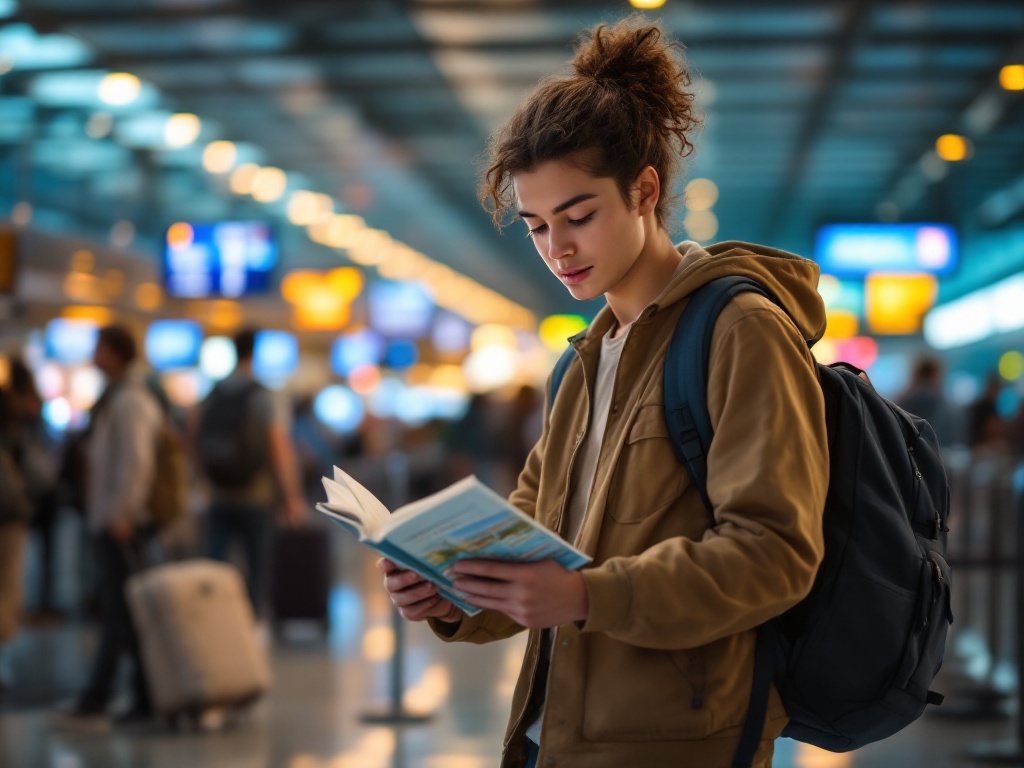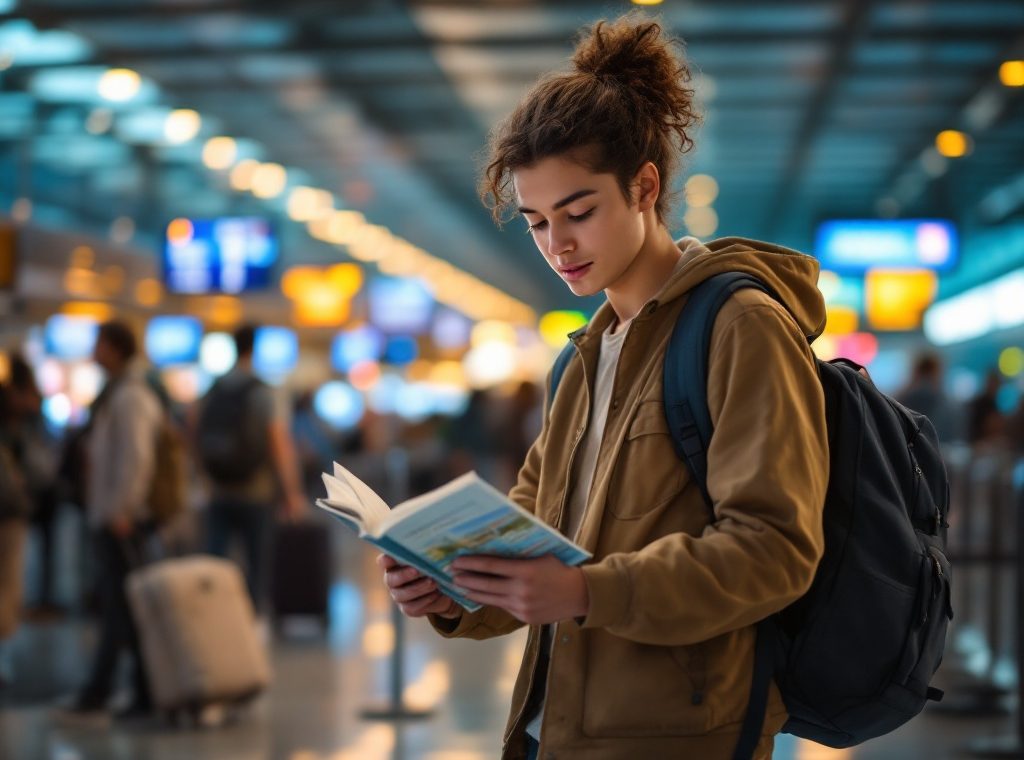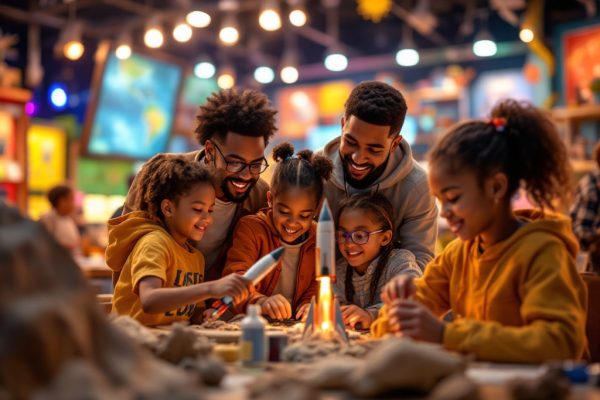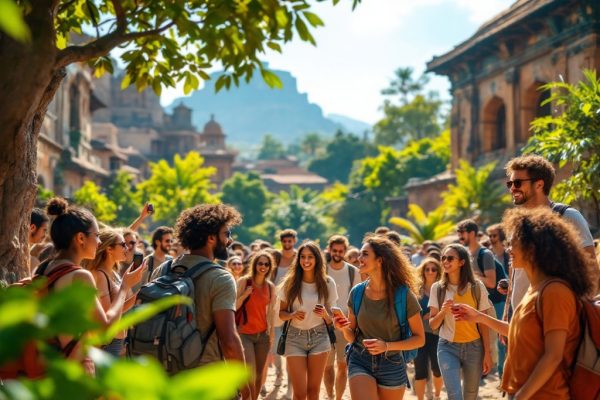Student Travel Safety: Essential Tips for a Secure Journey
Planning a trip abroad? Student travel safety hinges on thorough planning and vigilance. This guide provides crucial pre-trip advice, including researching your destination, securing travel insurance, and creating emergency plans. Learn how to stay safe while traveling, from protecting your documents and blending in, to navigating public transport and handling emergencies. Empower yourself with these essential tips for a secure and enriching travel experience. Read on to start your journey safely.
Important information

- Research your destination: Before traveling, learn about local laws, customs, and safety concerns. Share your itinerary with family or friends.
- Insurance and finances: Get travel insurance for medical emergencies, cancellations, and lost luggage. Set up an emergency fund and alert your bank about your travel.
- Health and safety: Consult your doctor about needed vaccines. Pack a first-aid kit and any prescription medications. Be aware of your surroundings and avoid risky behaviors.
- Emergency preparedness: Know local emergency numbers and your embassy’s contact information. Have a plan for medical emergencies and share it with a trusted contact.
- Cultural awareness: Learn basic local phrases and respect local customs. This can improve your experience and keep you safe.
Understanding Student Travel Safety
Planning, vigilance, and post-trip follow-up are crucial for safe student travel. Before you go, research your destination thoroughly, familiarizing yourself with local laws, customs, and potential safety concerns. Secure your passport and visa, and share your itinerary with family or friends. Registering with a travel safety program and acquiring travel insurance offers added protection and peace of mind.While traveling, stay aware of your surroundings. Choose reliable transportation and avoid risky behaviors. Keeping a low profile and securing your belongings can deter unwanted attention.After your trip, share your experiences, especially reporting any safety incidents. This can provide valuable insights for future travelers and improve overall safety measures.
Researching Your Destination
Staying safe while traveling as a student starts with thorough research. Investigate potential hazards such as unsafe neighborhoods and common scams. It’s also crucial to stay updated on current events, including political unrest or natural disasters. Monitor local news and government travel advisories for real-time updates. This information will empower you to make informed decisions about your itinerary and take the necessary precautions. Being prepared is the key to a safe and enjoyable trip.
Identify Potential Hazards
Before embarking on any journey, thorough research is essential for identifying potential hazards. This includes assessing safety concerns like crime rates, political instability, and the risk of natural disasters. Understanding these factors allows you to make informed decisions about your destination and necessary precautions. Beyond safety, researching local laws and customs is crucial to avoid legal issues and cultural misunderstandings. A well-researched trip is ultimately a smoother and safer one. Here’s how to research effectively:
Evaluate safety concerns. Research crime rates, political climates, and the prevalence of natural disasters in your chosen destination.
Understand local laws and customs. Familiarize yourself with the specific regulations and cultural norms of the region to avoid legal repercussions or cultural misunderstandings.
Plan for emergencies. Identify nearby hospitals, police stations, and your country’s embassy or consulate. Note down emergency contact numbers.
Stay Informed on Current Events
Stay informed about safety and security by monitoring local news and government alerts. For real-time updates, follow official social media channels and consult your home country’s travel advisories.
Register with Your Embassy
Registering with your embassy is crucial for your safety and convenience while traveling abroad. In emergencies, such as natural disasters or political unrest, registration enables officials to quickly locate and assist you. It also streamlines the process of replacing a lost or stolen passport. Furthermore, your embassy provides valuable resources and information on local laws and customs, helping you navigate your new environment with ease.
Planning and Preparation
Planning a safe trip begins with booking accommodations in advance. This not only secures your lodging and eliminates last-minute searches in unfamiliar locations, but also gives you time to research the hotel’s safety measures. A comprehensive safety plan is crucial. Map your routes and transportation, and share this plan with someone you trust. Regular check-ins with this contact are highly recommended. Prepare an emergency contact list that includes family, friends, your school’s international office (if applicable), local emergency services, and your embassy or consulate. These contacts can be invaluable in unforeseen situations.
Book your accommodations in advance. This secures your lodging and allows time to research hotel safety measures.
Develop a comprehensive safety plan. Map your routes, transportation, and share it with a trusted contact.
Maintain regular check-ins with your designated contact person. This ensures someone is aware of your whereabouts.
Compile a comprehensive emergency contact list. Include family, friends, your school’s international office (if applicable), local emergency services, and your embassy or consulate.
Advance Booking for Accommodations
Secure your accommodations in advance for a safer, more enjoyable trip. Pre-booking not only provides peace of mind but also allows you to research the area, comparing reviews and security features like well-lit entrances and secure locks.
- Research the area and compare reviews.
- Check for security features such as well-lit entrances and secure locks.
- Enjoy peace of mind knowing your accommodation is secured.
Furthermore, booking ahead often translates to better prices, helping you stay within budget. This is especially important for students, allowing them to focus on their travel plans rather than scrambling for last-minute lodging, particularly at night. A confirmed reservation lets you relax and savor your travel experience.
- Secure better prices by booking in advance.
- Stay within your travel budget.
- Focus on travel plans instead of last-minute lodging searches.
- Relax and enjoy your trip with a confirmed reservation.
Developing a Safety Plan and Route
Planning your route to and from the airport can significantly reduce travel stress. Before you arrive, research different transportation options such as airport transfers, taxis, or public transportation. Booking in advance is highly recommended, especially for late arrivals or if you are unfamiliar with the city. A map or navigation app can be invaluable in navigating unfamiliar routes. Having a pre-planned route ensures a smoother, more efficient trip, allowing you to reach your destination quickly. However, it’s always wise to be prepared for unforeseen delays, such as unexpected traffic. Carrying local currency can be helpful for incidentals or if other payment methods encounter issues.
Creating an Emergency Contact List
Before your trip, create an emergency contact list. Include local emergency numbers such as 911 (US) or 999 (UK), and your embassy or consulate’s information. Add family and close friends’ numbers as well. Keep a physical copy and save these contacts on your phone for easy access during an emergency.
Travel Insurance and Financial Security
Traveling abroad as a student? Travel insurance is essential. It protects you from unexpected expenses like trip cancellations, medical emergencies, and lost luggage. It often covers medical bills, evacuations, and repatriation.
Insurance Coverage
While insurance offers crucial protection, it’s not all-encompassing. Travel insurance safeguards against:
- Trip cancellations,
- Medical emergencies,
- Lost luggage.
Essential Tips for Students Traveling Abroad
- Maintain emergency funds for unexpected costs like flight changes or alternative accommodations,
- Notify your bank of your travel dates to avoid card blockage,
- Consider travel-friendly debit and credit cards for better exchange rates and lower fees abroad.
With proper preparation, you can relax and enjoy your international experience.
Benefits of Comprehensive Travel Insurance
Travel insurance offers invaluable peace of mind by protecting you from unforeseen issues during your travels. It covers a range of situations, from trip cancellations and medical emergencies to lost luggage and repatriation. This comprehensive coverage takes care of both the financial and logistical hurdles that can arise when things go wrong, especially for students traveling abroad. Knowing they have a safety net allows students to explore the world with greater confidence. Travel insurance handles expenses such as medical bills, emergency evacuations, and repatriation, ensuring you’re not left stranded or facing insurmountable costs. This protection empowers students to embrace new experiences and focus on their studies or adventures, secure in the knowledge that they are protected should the unexpected happen.
Setting Up Emergency Funds
Create an emergency fund in a separate bank account. Small, regular deposits will quickly build a safety net for unexpected issues like flight cancellations, medical bills, or lost luggage, ensuring you have access to funds when they’re most crucial.
For emergencies abroad, a prepaid travel card offers easy access, simple fund management, and secure money handling.
Notifying Banks and Managing Money
Before starting your journey, inform your bank and credit card company about your travel plans, including dates and destinations. This will prevent them from flagging your transactions as suspicious and potentially blocking your cards. Sharing your itinerary, specifically the countries you’ll be visiting and the duration of your trip, will ensure smooth transactions abroad. Consider activating transaction alerts to monitor your spending in real-time and quickly identify any unauthorized activity.
Cultural Awareness and Communication
Learning basic local phrases, such as greetings and expressions of gratitude, significantly enhances your travel interactions. It demonstrates respect and facilitates smoother communication.
Respecting local customs is crucial for a positive experience, so researching cultural etiquette beforehand is always helpful. Learning about dress codes and social behaviors helps you avoid unintentional offenses and fosters meaningful cultural exchange.
- dressing modestly at religious sites is often expected,
- in some cultures, public displays of affection are considered inappropriate.
Such cultural sensitivity enriches your travel experience and builds bridges between different cultures.
Learning Basic Local Phrases
Learning a few basic local phrases can greatly improve your travel experience. Simple greetings like “hello,” “thank you,” and “excuse me” show respect and create positive interactions. Knowing practical phrases for asking directions or ordering food is invaluable for navigating everyday life and connecting with locals. In emergencies, knowing key phrases can be crucial.
Learning Resources
- Phrasebooks: these remain a popular choice for learning basic phrases.
- Language learning apps: these offer interactive lessons and often include pronunciation guides.
- Online dictionaries: these provide quick translations and can be helpful in a pinch.
Benefits of Learning Local Phrases
- Enhanced interactions: using local phrases demonstrates respect and facilitates communication.
- Improved navigation: knowing how to ask for directions or order food makes daily life easier.
- Increased safety: in emergencies, key phrases can be vital for getting help.
- Cultural sensitivity: making an effort to learn the local language shows appreciation for the culture.
Use these tools to enrich your trip and demonstrate cultural sensitivity.
Respect for Local Customs and Norms
Respecting local customs enhances your safety and demonstrates cultural sensitivity. Understanding dress codes, social norms, and a few basic phrases can prevent misunderstandings. This awareness helps students integrate respectfully and reduces the chance of attracting unwanted attention. For instance, dressing modestly in conservative areas and avoiding public displays of affection increases safety. Learning simple greetings and phrases in the local language not only shows respect but also fosters positive interactions with residents. Here’s how you can navigate cultural differences effectively:
Dress Code
Dressing modestly, particularly in conservative areas, can significantly enhance your safety. Consider the local customs regarding attire and adapt your clothing choices accordingly. This shows respect for the local culture and can help you avoid unwanted attention.
Social Norms
Be mindful of social norms and customs, such as public displays of affection. Researching and observing local etiquette can prevent misunderstandings and foster positive interactions with residents. Respectful behavior contributes to a safer and more enriching experience.
Language
Learning basic greetings and phrases in the local language demonstrates respect and facilitates communication. Even a few words can go a long way in building rapport with locals and navigating everyday situations.
Research
Prior to your trip, research the specific cultural norms of your destination. This will prepare you for potential cultural differences and help you avoid unintentional offenses. Understanding local customs is crucial for a safe and respectful travel experience.
Health and Medical Considerations
Before embarking on your trip, consult your doctor to discuss necessary vaccinations and preventive medications. Pack a comprehensive first-aid kit containing essentials like bandages, antiseptic wipes, and pain relievers. Thoroughly research potential health risks specific to your destination and take all appropriate precautions.
Don’t forget your health insurance card and ensure you have a sufficient supply of any necessary prescription medications. Carry a copy of your prescription as well. Locate nearby medical facilities at your destination in case of emergencies.
Consider purchasing travel insurance that includes coverage for medical expenses incurred while abroad. This can provide valuable financial protection in unforeseen circumstances.
Familiarize yourself with local laws and regulations concerning alcohol and drugs. Avoid excessive alcohol consumption, especially in unfamiliar environments. Never accept drinks from strangers, and if you’re taking prescription medication, refrain from mixing it with alcohol or other drugs, as this can have dangerous consequences.
Vaccinations and Disease Prevention
Consult your doctor or a travel health specialist four to six weeks before your trip to discuss necessary vaccinations. Recommendations vary based on your destination, planned activities, and health history. Ensure your routine immunizations are up-to-date. Also, consider travel-specific vaccines such as Hepatitis A and B. You might also need Typhoid, Yellow Fever, and Meningitis vaccinations. Remember to bring your vaccination records with you.
Access to Medical Care and Prescription Medications
Pack a full supply of any necessary prescription medications.
Ensure your prescriptions are valid at your destination and locate nearby hospitals and pharmacies in advance.
Consider international health insurance to cover potential medical expenses and emergency evacuations.
Carry a copy of your medical history, including allergies and current medications.
Learn basic medical phrases in the local language, such as “I need a doctor”.
Familiarize yourself with local healthcare customs.
Remember your embassy or consulate can provide assistance if needed.
Responsible Alcohol and Drug Use
Travel smart and stay safe by using alcohol and drugs responsibly. Impaired judgment increases the risk of accidents and injuries. You’re also a more likely target for criminals when under the influence. Remember to research local laws and regulations regarding drugs and alcohol, as they can differ significantly from your home country. Moderation is key to a safe and enjoyable trip.
Personal Safety Tips
Photocopy your passport and visa to safeguard these essential documents. Store these copies separately from the originals.
Exercise caution around strangers. Refrain from divulging personal information or accepting offers from unfamiliar individuals.
Traveling in groups significantly enhances safety, particularly at night or in unknown areas.
Implement the buddy system for added security. This ensures someone is always aware of your location.
Maintain a low profile by avoiding ostentatious jewelry or electronics. Dress discreetly to blend in with your environment to further bolster your safety.
Protecting Important Documents
Photocopy your passport and visas and keep these copies separate from your original documents.
Use a money belt or a hidden pouch to secure valuable documents and cash.
Store your valuables in the hotel safe.
Being Cautious with Strangers
Be cautious of strangers and avoid sharing private information like accommodation details or your itinerary.
Maintain a safe distance from unfamiliar individuals and politely decline unsolicited offers of help.
If a situation makes you uncomfortable, move to a public area.
Report any suspicious behavior to local authorities or your program coordinator.
Staying in Groups
Group travel offers several advantages. It enhances safety by deterring potential threats. It streamlines logistics, distributing tasks like navigation and decision-making. This shared responsibility fosters mutual support and a sense of community. Furthermore, group travel enriches the overall experience, creating more enjoyable and memorable journeys.
Using the Buddy System
Traveling with a companion increases your safety by providing mutual support and an extra set of eyes. This added security is especially valuable in unfamiliar environments. Sticking together minimizes potential risks. Essentially, there’s strength in numbers.
Maintaining a Low Profile
A low speaking voice can help students blend in, especially in crowded or unfamiliar locations. Avoiding loud conversations, particularly in American English, minimizes unwanted attention. A quiet demeanor is generally preferred in busy or new environments.
Public Transport and Road Safety
Stay safe on campus by being aware of your surroundings. Avoid walking alone, particularly at night, and stick to well-lit, populated areas. Pedestrian safety is crucial, so always obey traffic signals and look both ways before crossing the street. Use crosswalks and avoid distractions like your phone, especially near roads. When possible, use safe transport options and familiarize yourself with local traffic laws. Sharing your planned routes with a trusted friend or family member adds an extra layer of security.
Be Aware of Your Surroundings. Stay alert and observe the people and environment around you.
Avoid Walking Alone at Night. If possible, walk with a friend or group, especially in the dark.
Stick to Well-Lit and Populated Areas. Choose routes that are well-illuminated and have other people present.
Obey Traffic Signals and Look Both Ways. Always follow traffic rules and check for oncoming vehicles before crossing any street.
Use Crosswalks. Utilize designated pedestrian crossings whenever available for increased safety.
Avoid Distractions Near Roads. Put away your phone and other devices that might divert your attention from traffic.
Use Safe Transport Options. Consider campus shuttles, public transportation, or ride-sharing services when possible.
Know Local Traffic Laws. Familiarize yourself with specific regulations and pedestrian guidelines on campus and in the surrounding area.
Share Your Routes. Inform a trusted contact about your planned travel, especially if walking alone or at night.
Awareness in Public Spaces
Be aware of your surroundings and avoid distractions like your phone.
Watch out for pickpockets, particularly in crowded areas.
Secure your valuables.
If you sense danger, seek a safe place and report any suspicious behavior to the authorities.
Pedestrian and Road Safety
Cross streets with caution, as traffic laws and driving customs can vary greatly between locations.
Use designated crosswalks and obey pedestrian signals.
Avoid distractions such as cell phones while crossing the street.
At night, wear bright clothing or use reflectors to increase your visibility.
Research destination-specific road safety advice before traveling.
Emergency Preparedness
Preparing for Emergencies
In emergencies, preparation is key. Familiarize yourself with local protocols and locate the nearest hospital. Compile a contact list of family, friends, and your school. Safety apps can also be invaluable; download a few and ensure your phone stays charged.
Responding to Medical Crises
Should a medical crisis arise, remain calm and evaluate the situation. Immediately contact local authorities or emergency services, then notify your emergency contacts and school. Individuals with pre-existing conditions should always carry necessary medications and pertinent medical information. Comprehensive travel insurance is vital, especially if it covers emergencies and evacuations.
Emergency Procedures and Resources
Familiarize yourself with local emergency procedures and keep important contacts readily available. These contacts should include local emergency services, your embassy or consulate, and personal emergency contacts.
If needed, contact the local police or fire department. Locate nearby hospitals and clinics.
Learn how to access emergency services and the local equivalent of 911. Ensure your phone is charged and consider a portable charger.
Download helpful safety apps that provide local alerts and key information. Prepare a physical first-aid kit stocked with essential supplies.
Dealing with Medical Emergencies and Illness
Prepare a comprehensive first-aid kit with necessary medications.
Learn basic first aid and research local emergency numbers and procedures.
In a medical emergency, promptly contact local services and inform your program coordinator and designated emergency contact.
Always carry your health insurance information, including essential medical documents like prescriptions and allergy details.
Locate nearby hospitals and clinics in advance.
Consider travel insurance that covers medical evacuation for serious emergencies.













